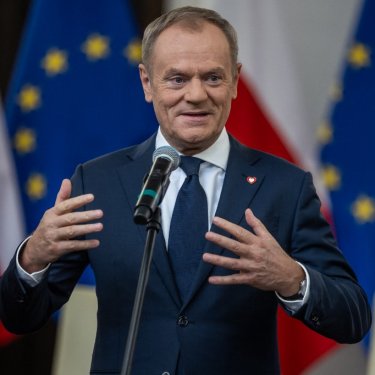RSF calls on the new Polish government to seize an historic opportunity for concerted and systemic reform in favour of press freedom

After the eight-year rule of Law and Justice, during which Poland fell from 18th to 57th place in the World Press Freedom Index, Reporters Without Borders (RSF) asks the government of Donald Tusk for comprehensive measures in favour of media freedom. The public media especially have to undergo systemic reforms after an inclusive public debate.
On 13 December, the Civic Coalition and other former opposition parties took power after having pledged to stop the democratic backsliding. The former ruling party, Law and Justice, did indeed undermine the independence of several institutions including the public service media, which provided biased coverage of the latest electoral campaign, while it continues to occupy some of the power centers including the Presidency of the Republic. However, the government of Prime Minister Donald Tusk disposes of a majority of more than 240 out of 460 members of the lower chamber of the parliament, the Sejm.
“After campaigning on rule-of-law issues and winning a solid majority in the parliament, the Polish ruling parties have the legitimacy and the power to significantly improve press freedom in a key European country. We ask them to transform the historic opportunity into systemic measures in favour of media independence and protection of journalists resulting from an inclusive public debate. RSF stands ready to provide its international expertise.
Before the elections of 15 October, RSF published 15 recommendations drafted in cooperation with Polish experts and media and discussed with the major ruling and opposition parties. The recommendations aim for an in-depth and broadly concerted reform of the public media, for equal opportunities in the market and in access to information for both private and public media, and for strengthening of journalists’ safety and rights.
As regards the reform of the public media, which is the priority of the new government, the changes must go beyond an overhaul of personnel. RSF proposes to increase transparency and decrease political influence in the oversight, funding and procedure of leadership appointment of the public television, radio and press agency. As one of the first steps, the organisation also recommends the adoption of a comprehensive bill to ensure their independence, impartiality and internal pluralism.
End of “repolonisation” policy
At an October meeting with RSF, a leading candidate of the then-opposition Civic Coalition and the new Minister of Justice, Adam Bodnar, agreed that “the Polish public media and the oversight institutions need a systemic reform which will provide guarantees for their independence from the government” and that “the political influence in the selection of the leadership of the public media should be reduced to the benefit of the involvement of civil society and experts”.
In relation to the private outlets, the policy of “repolonisation” with the aim to exercise control over the editorial line should be immediately scrapped by divesting investments of state and state-owned companies from media ownership. Finally, RSF recommends measures to protect journalists against abusive lawsuits and violence at demonstrations.
In RSF’s 2023 World Press Freedom Index, Poland is ranked 57th out of 180 countries after having fallen by 39 places since 2015 when Law and Justice came to power.
